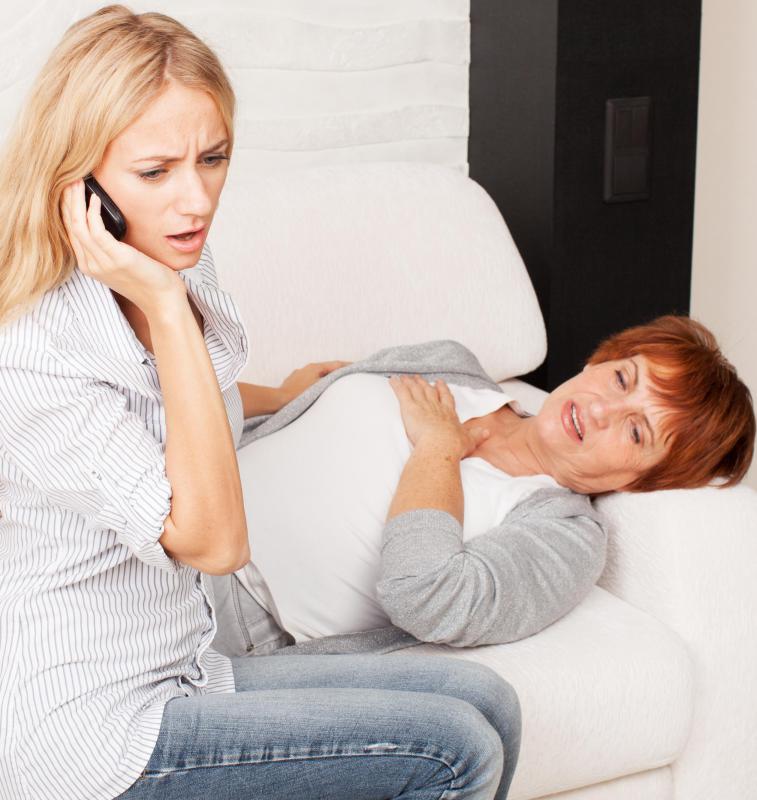At WiseGEEK, we're committed to delivering accurate, trustworthy information. Our expert-authored content is rigorously fact-checked and sourced from credible authorities. Discover how we uphold the highest standards in providing you with reliable knowledge.
How Do I Recognize Swelling from an Allergic Reaction?
You will probably easily recognize swelling from an allergic reaction if it is caused by a skin irritant coming in contact with your arm, leg, face, or torso, because the swelling with likely be in the area where contact was made. More severe reactions may cause swelling of the lips, tongue, and face. These symptoms are a medical emergency and should be dealt with immediately. Sometimes swelling from an allergic reaction can be subtle, or you may not know what it was to cause the swelling.
Many allergic reactions cause swelling that is localized to a specific area. For instance, if you are allergic to hair dye and place a small portion on your arm, that spot on your arm would be the most likely to swell. You would likely also experience a rash with redness, itching, and sometimes blistering or peeling.

In other cases swelling from an allergic reaction may be more difficult to track. If you use a soap, for instance, that causes a reaction, you may experience mild to severe swelling all over your body. Unless the soap was the only product you used on your body that day, meaning no lotions, perfumes, or laundry detergents, it may be hard to pinpoint the source of swelling. Once way to determine if widespread swelling is an allergic reaction is the presence of redness or itching. Most skin reactions will include some other form of inflammation or irritation.

More severe swelling from an allergic reaction may cause your lips, face, and tongue to swell. In very serious cases, your tongue may swell large enough to block your throat. The throat itself may also swell and close up, leading to suffocation. This type of severe reaction can occur after eating a food you are allergic to, or getting stung by a bee or another insect.

Additional symptoms will likely be present if you have severe swelling from an allergic reaction. You may still experience skin irritation, even in a serious situation. You may also experience wheezing, shortness of breath, dizziness, heaviness in the chest, nausea, or shock. If any of these reactions occur, especially if you have recently eaten a new food or been stung by an insect, then you should call emergency medical services right away. Without treatment, a severe allergic reaction can lead to serious health complications and even death.
AS FEATURED ON:
AS FEATURED ON:

















Discussion Comments
The localized swelling caused by allergies is actually the mechanism that skin prick testing uses to diagnose allergies.
The allergen is placed on an instrument and then, the skin is pricked with it. After waiting for some time, the nurse or doctor checks to see if there is swelling where the skin was pricked.
So as the article said, if one notices swelling in only one specific area, that's a clear sign of an allergic reaction to an allergen that the skin came in contact with.
@SteamLouis-- That's a good question.
If the cause is infection like pink eye (conjunctivitis), there will most likely be redness (as the name suggests) and colored discharge in addition to the swelling. It can be however fairly difficult to tell this apart from allergies because some types of eye allergies can also cause eye discharge and redness of the eyes. So it's actually best to show it to an eye doctor for a diagnosis.
If it is allergies though, there might be additional signs such as runny nose, sneezing and congestion. These don't occur with eye infections. Even if you suspect eye swelling due to allergies, avoid touching your eye. If it turns out that it's an infection, the bacteria or virus may spread to the other eye.
How can I know whether eye swelling is caused by allergies or something else, like an infection? I believe both can cause eye swelling right?
Post your comments